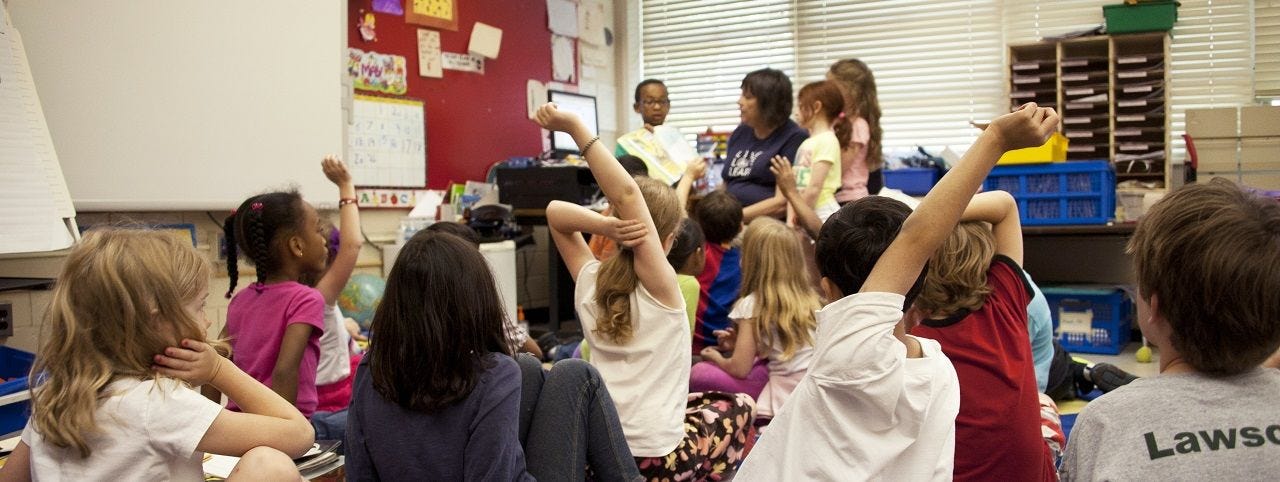Why schools are the key battleground
Why I’ve decided not to return to my journalism job, and why the battle for sex-based rights will be won or lost in schools
I wanted to share some news with readers that those who listened to my recent Triggernometry interview will already know: I’m not going to be returning to The Economistafter my year-long sabbatical, which was due to end at the beginning of April. Instead I’ll continue to work for Sex Matters, as well as writing this newsletter and starting to develop other projects (it’s too early for me to share any details).
If you are not a subscriber to my weekly newsletter, you might like to sign up for free updates. I hope that in the future you might consider subscribing.
In some ways, the decision was difficult. The Economist has been in my life since I started reading my father’s copies as a teenager, and for most of the nearly 20 years I worked there I thought I’d never work anywhere else. During that time the revenue base of journalism has been eaten up by search engines and social media, and few well-paid, stable jobs remain. I had one of those jobs, and I’ll always be grateful for it.
Before working for The Economist, I had never stayed in any job for long. I like doing new things, and once I feel I understand the concepts involved and can perform well, I tend to lose interest. I like discovery much more than implementation. But The Economist was an amazing combination of stable employment and intellectual challenge. Just when I had started to get bored covering education, I was asked to move to Brazil. When I came back from Brazil I edited the International section, then the Finance and Economics section, and finally Britain. In between that, I did stints on the commercial side, working with the events and executive-education teams.
The Economist is also a place where ideas matter, and where debate is expected to be polite but exceedingly robust. I suppose that culture changed a bit in response to a big influx of recent graduates, but the extremely strong emphasis on collegiality—a product in part of the lack of bylines, in part of one editor after another protecting that culture fiercely—survives and thrives. The fact that I was able to continue to work there despite the things I wrote and said is testament to that. The editor heard plenty of criticism of me, and some calls to sack me, and yet she hosted my book launch at the paper’s offices. It can’t have been easy for her, especially because I don’t think she found what I was saying particularly urgent or interesting! (She’s an economist by training, and the sorts of topics that absorb her are globalisation, the rise of China, the impact of technology on the world economy and so on. I think she’s deeply bored by anything that smacks of culture war.)
But as I have said in several interviews, she has a spine of steel, despises bullies and is passionate about free speech. And that turns out to be enough for gender-critical women to be employable—their boss doesn’t need to agree with them, merely to refuse to bow to the mob. I am more grateful than I’ll ever be able to express for that. And if there were more people like her in senior positions, we would never have arrived at such a parlous place.
So, a difficult decision in some ways—but an easy one in others. When I started my sabbatical, I thought I could make a meaningful difference to the campaign for sex-based rights in just a year, and would then be able to return to my old life. (Campaigning work is completely incompatible with editorial independence; I had to choose.) But I had wildly underestimated the degree of institutional capture. We have made amazing progress in the past year, but the work has barely started. I cannot possibly stop now.
The two key battles preoccupying me personally are clarity about sex in schools and the definition of sex in law (Sex Matters is working on other things too, and I’ll write more about both, as well as the battle over self-ID in Scotland as it unfolds). In this edition I’ll talk about schools, and return to the definition of sex in law sometime in the next few weeks.
Schools are where the next generation of sex-denialists are formed. They’re where children are lied to about their bodies and identities, where the pernicious idea that being a girl or boy means being “femme” or “masc” spreads, and where children are indoctrinated in its logical correlate: that if you’re not femme you can’t be a girl, and if you’re not masc you can’t be a boy. These ideas spread from child to child and are also proselytised by many teachers.
Schools are also where children are “socially transitioned”—presented to their classmates and teachers as members of the opposite sex, a charade everyone has to play along with on pain of disciplinary action for bullying and discrimination. Amazingly, this often happens without parents being told, let alone asked. Journalist Jill Foster has an excellent piece in the Daily Mail this week about this phenomenon. She says that since it came out parents are continuing to message her, telling her that the same and even worse has happened to their children.
I and others, both inside Sex Matters and in other campaign groups such as Transgender Trend, Safe Schools Alliance and the Bayswater support group for parents, have put a lot of thought in the past year into how to stop this sort of thing happening in schools. Different people would emphasise different parts of this, and perhaps disagree with some of my take, but to me it’s all interlinked—the social transition of children; the imposition of “preferred pronouns”; gender identity as the criterion for admission to single-sex spaces; the indoctrination in lessons. If one element is stopped, the others become much harder, even impossible.
Here’s what I mean. Suppose a girl approaches her school and says: I know you think I’m a girl, and that’s what it says on my records, but really I’m a boy (or non-binary, or whatever). Maybe every single teacher, and every single pupil, think this is wonderful, and that the child really is a boy and should henceforth be included in boys’ activities and spaces. Maybe the parents are totally on board. But if the Department for Education reminds schools of their statutory obligation to maintain accurate records of pupils’ identities—including their sex—and to provide single-sex toilets and changing-rooms—the school simply won’t be able to accommodate the child’s demands.
And that’s before you get to other laws and regulations constraining what schools do. Letting the occasional boy play in girls’ sports on the basis of gender identity probably constitutes indirect sex discrimination against girls. Forcing everyone to refer to boys as girls on demand, and vice versa, is a major infringement of free-speech rights—and hampers teachers’ ability to perform their statutory safeguarding duties. Acting lawfully means schools simply cannot accommodate social transition, full stop.
And then what’s the point of teaching children that they are the sex they think they are? That lie will be contradicted on the ground every day. Or entering into negotiations with hard-line transactivist parents? No matter how much those parents push, if you recognise that social transition is unlawful in schools, you will simply have to tell them that your approach will rather be to make sympathetic accommodations for their troubled child that do not harm other people’s rights. You won’t even be tempted to lie to parents about their children’s identity: the question won’t even arise. And if social transition isn’t happening in the school, why would you invite in outside groups that say it must, or use their teaching materials?
I have talked to plenty of parents distraught by the way a school has supported or even instigated their child’s transition. What bothers them most is the indoctrination, not the school records and facilities. They want the ideologues out, and teachers told to stop presenting lies as if they’re true.
I want all of that too. But I still think that facilities and records are the place to start, for two reasons. One is that they are really clear: you either let kids use opposite-sex facilities or you don’t; you either change M to F or F to M on school records or you don’t. To coin a phrase—it’s binary. The other is that there are unambiguous rules setting out what schools must do regarding facilities and record-keeping—not can do, but must do. Indoctrination is harder to define, and happens behind the closed doors of classrooms.
One big question is why so many schools are acting unlawfully. In part it’s because activists have run an extraordinarily successful misinformation campaign: many head teachers now believe flat-out lies, for example that the Equality Act says you must let everyone use the single-sex facilities of their choice. (You can read the law yourself, and see that it doesn’t say anything of the sort.)
But I place the main blame on the Department for Education. It too has statutory duties, namely to act as coordinator and regulator of the entire school system. Its inaction as schools have committed large-scale abuses of children’s human rights in the name of “trans inclusion” is beyond disgraceful.
I’m afraid I have no faith that the education secretary, Gillian Keegan, will sort things out. She is on record as claiming that “trans women are women”, and since being appointed she has given wishy-washy interviews in which it’s clear she regards social transition in school, and wholesale indoctrination, as marginal. She seems to think we can fix it all by telling everyone to “be kind” and work things out “case by case”.
So despite the letter of the law being crystal clear, this too is likely to be a long-drawn-out fight. But one that is more winnable than in any other type of institution, all the same. That’s in part because children’s safety and wellbeing are supposed to be the primary consideration in schools, and all education professionals have statutory duties with respect to child safeguarding. But it’s also because children cannot have gender-recognition certificates (GRCs), and so all children’s sex, for all legal purposes, is their biological one.
This, by the by, is one reason why the Scottish government’s Gender Recognition Reform Bill is so terrible. By lowering the age at which someone can get a GRC from 18 to 16, it will create children entitled to change the sex on their birth certificates. (I suppose there may have been one or two over-18s in schools with GRCs, but I’ve never heard of one, and in any case they’re not minors. The requirement to have a diagnosis of gender dysphoria and to live in your “acquired gender” for two years, will have slowed things down too.)
A GRC changes your sex for some legal purposes; which ones, no one can say for sure. Will single-sex sixth forms across Britain have to admit 16-year-olds who have changed their legal sex in Scotland? Will schools have to change those pupils’ sex on their pupil records? As things stand both courses are legally risky.
At the moment, many schools are already assuming that the answer to these questions is yes, not just for pupils with GRCs but on the basis of self-ID. This could be stopped overnight with clear guidance from the DfE. But once there are under-18s with GRCs the legal waters will be muddied. I think legally it’s arguable that the purpose of single-sex schools, and of accurate pupil records, are such that sex for these legal purposes means sex, not “sex as modified by a GRC”. But courts can make stupid decisions, and I’d much rather these waters weren’t muddied.
Leaving decisions regarding social transition to schools isn’t just a disaster for children, it’s deeply unfair on school leaders. Some of them don’t deserve any sympathy—the horrific stories I hear of self-righteous ideologues threatening to report parents to social services if they don’t affirm their child’s trans identity have made me very cynical about the teaching profession. But some teachers and schools are desperately trying to hold the line, and it cannot be easy for them to cope with the pressure from all sides.
The great majority of parents, I’m certain, don’t want schools lying to their kids, and think that allowing kids of one sex to use facilities nominally reserved for the other is barking mad. But there are also parents who have decided to socially transition their child, and if they’re to fulfil that implicit lifelong promise that the world will treat their children as members of their “target sex”, every single other person has to be browbeaten into submission. As long as the government suggests that it is possible for even a few children to socially transition in schools, those sorts of parents will insist that their child is one of that tiny number. Without hard-and-fast authority to say “No, never”, head teachers will be under unrelenting pressure.
If you are interested in an in-depth analysis of the relevant law, read our recent work at Sex Matters setting out what the DfE needs to tell schools.
If you would like to become a paid subscriber and receive full access to my weekly newsletter, you can sign up here.




